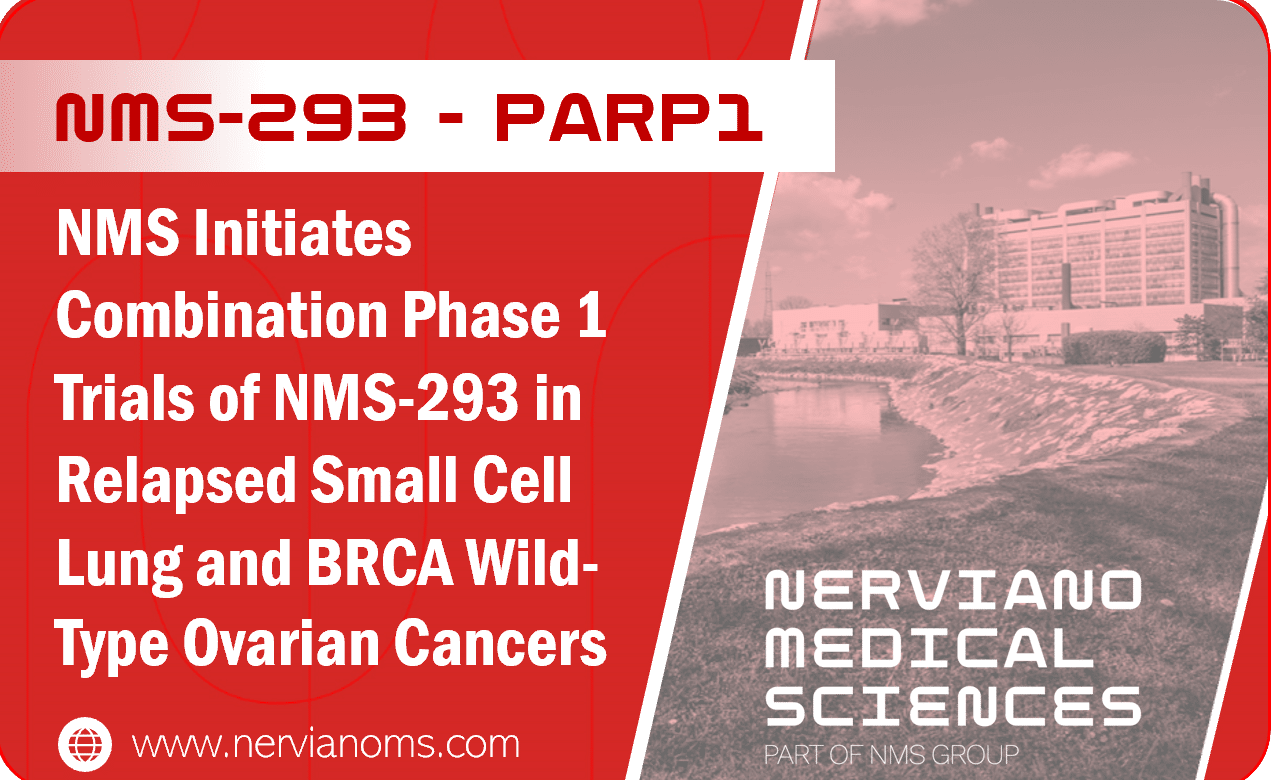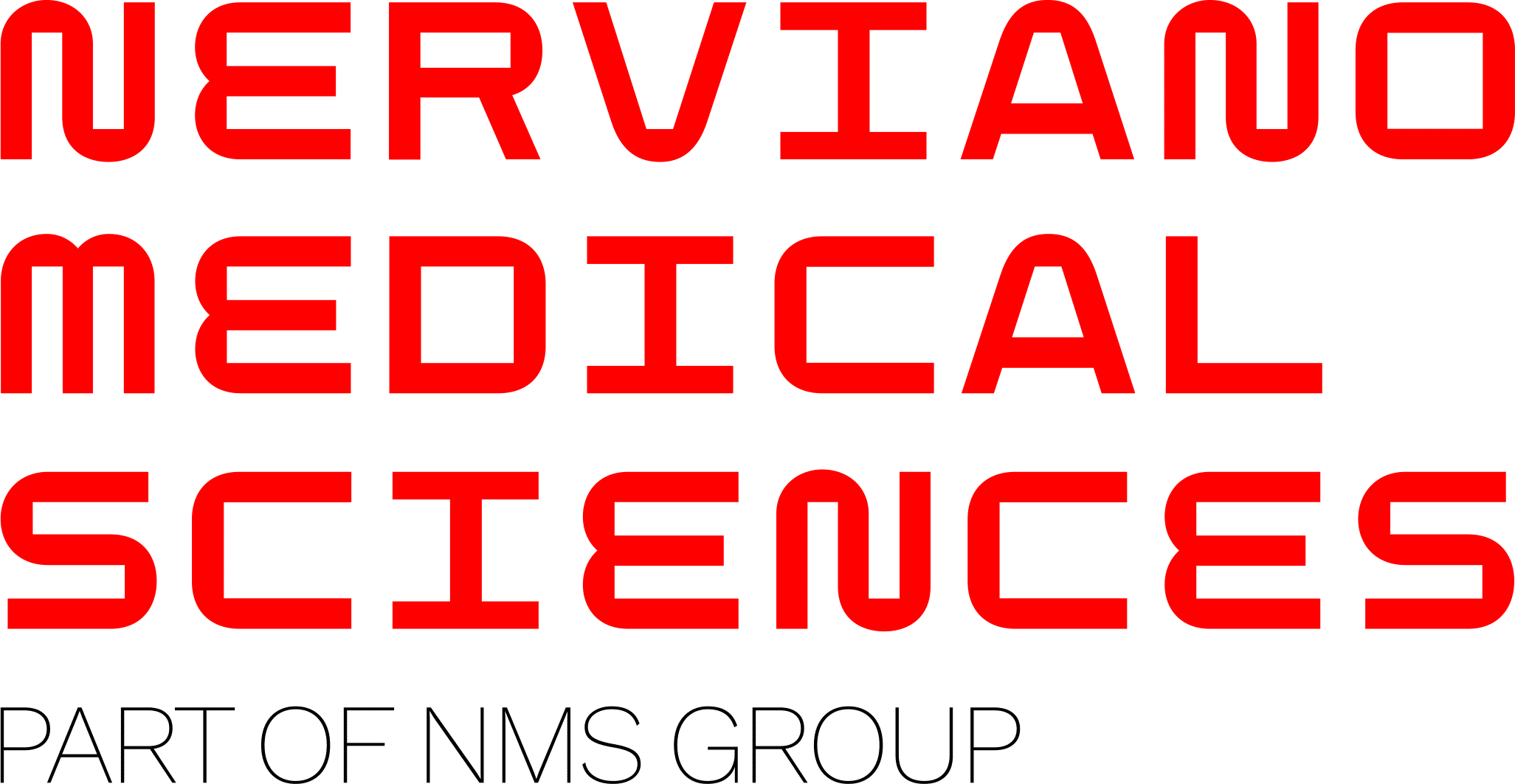Nerviano Medical Sciences Initiates Combination Phase 1 Trials of NMS-293 in Relapsed Small Cell Lung and BRCA Wild-Type Ovarian Cancers
NERVIANO, Italy and BOSTON, Mass., 28 April 2025 – Nerviano Medical Sciences S.r.l. (NMS), a clinical-stage oncology company developing targeted therapies across DNA damage response and kinase pathways, today announced the initiation of two Phase 1 clinical trials evaluating its unique non-trapping, highly specific and brain penetrant PARP1 inhibitor NMS-293 in combination therapies for relapsed small cell lung cancer (SCLC) and BRCA wild-type ovarian cancer. NMS-293 represents a third generation of PARP1 inhibitor using non-trapping as a way to combine with DNA-damaging therapies while preserving bone marrow safety. In this way, NMS-293 addresses tumors outside of BRCA or homologous recombination (HR) repair mutations which is unique. BRCA/HR mutation therapies represent only a small minority of tumors, mainly subsets of pancreatic, breast, prostate and ovarian cancers. Thus, therapies that leverage DNA damage response but are not limited to synthetic lethality of BRCA/HR mutations such as NMS-293 combinations with DNA damaging agents could address many tumor types in the future.
PARPA-293-004: NMS-293 with Temozolomide in Relapsed SCLC
This open-label, single-arm Phase 1 trial will enroll approximately 10 patients with relapsed SCLC who have progressed after platinum-based chemotherapy, immunotherapy and other standards of care. The objectives include safety and preliminary anti-tumor activity. This regimen is similar to the ongoing Phase 2 -002 study in relapsed high-grade glioma. Boosting temozolomide activity in this relapsed setting of SCLC could lead to accelerated registration pathways and future early line combination study options with a variety of DNA-damage modalities.
ClinicalTrials.gov Identifier: NCT06931626
PARPA-293-003: NMS-293 with Topotecan in BRCA Wild-Type Ovarian Carcinoma
This open-label Phase 1 study will enroll approximately 24 patients with recurrent ovarian cancer who have received platinum-based treatments and other standards of care, including patients with platinum resistance. The objectives include safety, dose-finding and preliminary anti-tumor activity. Boosting topotecan activity in patients with relapsed ovarian cancer could lead to accelerated registration pathways as well as various DNA-damaging modality combination options for future early line studies.
ClinicalTrials.gov Identifier: NCT06930755
The rationale for initiating these trials is supported by both preclinical evidence and emerging clinical data from temozolomide combination studies which revealed an unprecedented combination safety profile coupled with preliminary antitumor efficacy in high grade gliomas (Mahnke, DDR Summit 2025 and Guerts et al, AACR-NCI-EORTC 2023) including glioblastoma (unpublished). NMS-293 is a highly novel third generation PARP1 inhibitor distinguished by non-trapping as shown preclinically with high potency, selectivity and brain penetrance. Taken together, the profile improves on poor bone marrow features of first and second generation trapping PARP1 inhibitors (Yap et al AACR 2024) and thus removes traditional barriers of combining a DNA damage repair inhibitor with a DNA damaging agent to address non-BRCA mutation tumors.
“These trials represent our focused, mechanism-driven approach to improving treatment outcomes in areas of high unmet medical need including relapsed small cell lung and BRCA wild type ovarian cancers,” said Lisa Mahnke, MD, PhD, Chief Medical Officer of NMS. “NMS-293 has the potential to establish a new third generation of PARP1 inhibitor and which is not being developed as a classical PARP1 inhibitor due its unique chemotype. NMS-293 is a highly potent, highly selective, non-trapping PARP1, inhibitor which is highly brain penetrant and which can be developed across many tumor types including brain tumors like GBM or others with or without brain metastases in combination with a variety of DNA-damaging modalities such as chemotherapies or ADC payloads to reach many non-BRCA-mutation tumors in the future.”
Supported by Strategic Capital
The program is being funded in part by proceeds from non-dilutive monetization of part of the Entrectinib (Rozlytrek®) royalties.



